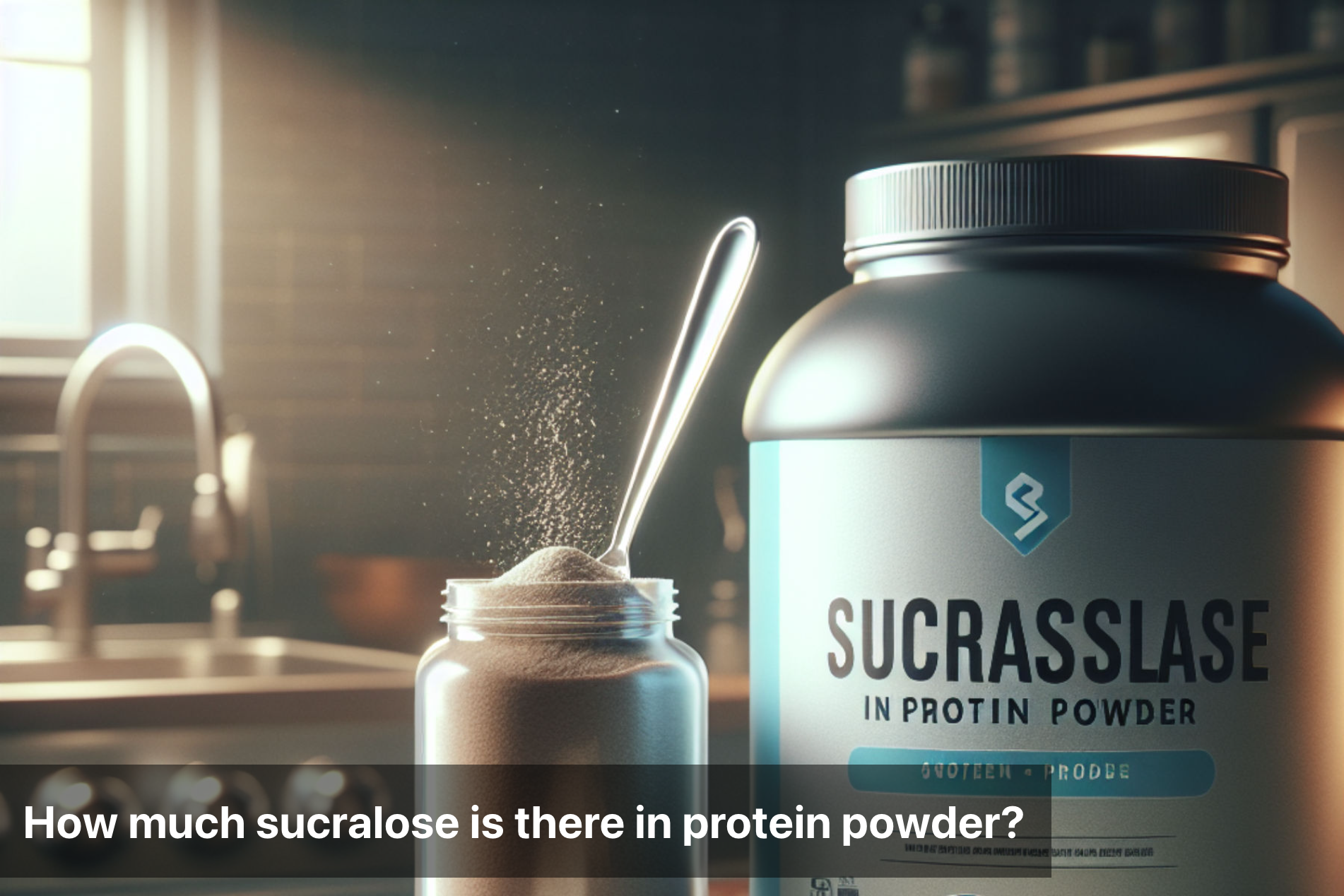
How much sucralose is there in protein powder?
Sucralose in protein powder is a commonly used artificial sweetener that provides sweetness without adding calories. It is a chlorinated sugar derivative that is around 600 times sweeter than sugar. Despite being FDA-approved and generally recognized as safe, there are concerns about its potential effects on health due to its artificial nature.
Many protein powder manufacturers incorporate sucralose into their products to enhance taste without significantly increasing caloric content. This allows individuals to enjoy sweeter flavors without worrying about excessive sugar intake. However, some consumers are wary of sucralose due to its artificial origin and may prefer natural sweeteners in their protein powders instead.
People often question the impact of sucralose on gut health and overall metabolism, wondering if its consumption may have long-term consequences. Understanding the role of sucralose in protein powder formulations can help individuals make informed decisions about their dietary choices.

Amount of Sucralose in Popular Protein Powder Brands
Sucralose is a commonly used artificial sweetener in protein powders, contributing to their sweet taste without adding extra calories. Many protein powder consumers are interested in knowing the amount of sucralose present in various popular brands to make informed choices based on their preferences and health concerns.
When looking at the sucralose content of different protein powder brands, it's important to consider both flavored and unflavored options. Flavored protein powders tend to contain more sucralose to enhance their taste profile, while unflavored varieties may have minimal or no sucralose added.
For individuals who are sensitive to artificial sweeteners or prefer a more natural taste, opting for protein powders with lower sucralose content or choosing unflavored versions could be the ideal choice. Some brands even offer sucralose-free options for those looking to avoid artificial sweeteners altogether.
By comparing the sucralose content across popular protein powder brands, consumers can select products that align with their nutritional goals and personal preferences. Reading product labels and understanding the sucralose content will empower individuals to make informed decisions when purchasing protein powders.
Sucralose in Protein Powder: Good or Bad?
Benefits
-
Low-Calorie Sweetener:
Sucralose provides sweetness without adding calories, making it a popular choice for those looking to reduce calorie intake while enjoying a sweet taste.
-
Blood Sugar Control:
Sucralose does not affect blood glucose or insulin levels, making it suitable for people with diabetes or those monitoring their blood sugar.
-
Dental Health:
Unlike sugar, sucralose does not contribute to tooth decay, making it a better option for oral health.
-
Heat Stability:
Sucralose is stable at high temperatures, making it suitable for use in protein powders that might be mixed into hot beverages or used in baking.
Drawbacks
-
Digestive Issues:
Some individuals may experience digestive discomfort, such as bloating or gas, when consuming sucralose, especially in large quantities.
-
Taste Concerns:
Some people find that sucralose has an artificial aftertaste, which can affect the overall enjoyment of the protein powder.
-
Potential Impact on Gut Health:
There is some evidence suggesting that sucralose may alter gut microbiota, which could have implications for digestive health over long-term use.
-
Controversial Health Effects:
While sucralose is generally recognized as safe by regulatory authorities, some studies have raised concerns about its long-term effects, including potential impacts on metabolism and glucose homeostasis.
-
Synthetic Nature:
Sucralose is an artificial sweetener, and some consumers prefer to avoid synthetic additives in their diet, opting for natural alternatives instead.
Result
Moderation is Key: For most people, moderate consumption of sucralose in protein powders is considered safe and can be part of a balanced diet.
Personal Sensitivities: Individuals with sensitivities or preferences for natural ingredients may choose to avoid sucralose and seek protein powders sweetened with natural alternatives like stevia or monk fruit.
Health Goals: Those with specific health goals or conditions, such as diabetes or weight management, may find sucralose beneficial due to its low-calorie nature and lack of impact on blood sugar levels.
Alternatives to Sucralose in Protein Powder
Stevia: Natural, zero-calorie sweetener.
Monk Fruit Extract: Natural, zero-calorie sweetener.
Erythritol: Low-calorie sugar alcohol.
Xylitol: Low-calorie sugar alcohol (watch for digestive issues).
Allulose: Rare sugar, low-calorie, low impact on blood sugar.
Coconut Sugar: Natural, less processed, contains some nutrients.
Agave Nectar: Sweet, low glycemic index.
Molasses: Contains vitamins and minerals, not calorie-free.

Protein Powders and Sucralose: A Detailed Analysis
Understanding the role of sucralose in protein powder is crucial for making informed choices that align with individual preferences and health goals. When selecting a protein powder, whether flavored or unflavored, the amount of sucralose present should be a key consideration.
For individuals looking to minimize their consumption of artificial sweeteners like sucralose, opting for protein powders that utilize natural sweeteners can be a healthier alternative. Ingredients such as stevia, monk fruit extract, or erythritol provide sweetness without the potential drawbacks associated with sucralose.
Moreover, those with concerns about the potential health effects of sucralose, particularly its impact on gut health and metabolism, may find peace of mind in choosing sucralose-free protein powder options. Prioritizing products that align with personal health goals and dietary preferences is essential in achieving overall well-being.
When it comes to selecting protein powders, weighing the pros and cons of sucralose and considering individual preferences is key. By staying informed and making conscious decisions, individuals can optimize their protein intake while supporting their health and well-being.
This Blog post is an initiative by Lo! Foods, to provide accurate and Nutritionist / Doctor approved information related to Health. Lo! Foods is India's leading brand for Everyday Functional Foods. Foods designed for specific Health conditions or Needs. Lo! Foods also runs India's largest range of Low Carb Healthy Cloud Kitchens, under the brand names of Lo!, ProteinChef, ATH (All Things Healthy) and DiabeSmart.















Leave a comment
Your email address will not be published.